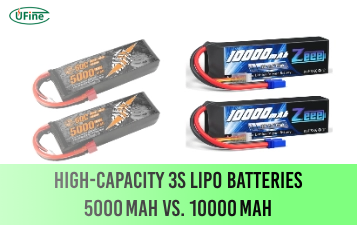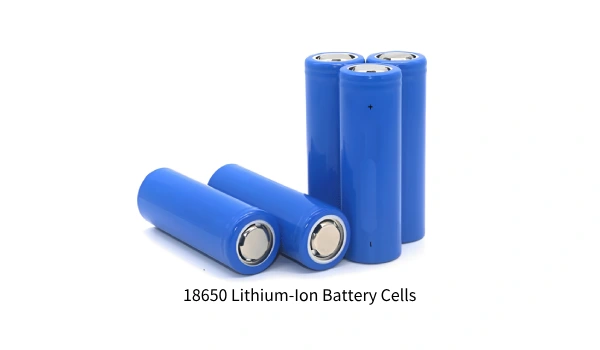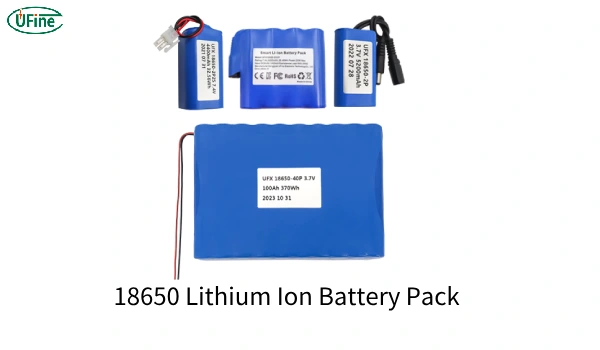This introductory article delves into the key aspects of 18650 lithium-ion battery cells, providing insights into 18650 battery life and weight. Furthermore, we offers guidance on where to buy 18650 batteries and the 18650 battery price range.
Part 1. How does 18650 battery weight affect the performance of devices?
Why should you care about 18650 battery weight?The weight of an 18650 battery can significantly impact the performance and efficiency of electrical devices, especially in applications where weight and balance are crucial.
1. Device Mobility and Handling
For portable electronics, such as flashlights, power tools, or drones, lighter batteries make devices easier to handle, improving overall user experience. A heavier battery might strain the user during prolonged use or limit maneuverability in devices where weight balance is key, such as handheld stabilizers or drones.
2. Energy Density vs. Power Output
Generally, an 18650 battery with a higher weight may indicate a larger energy capacity because it could contain more active material. Higher-capacity cells often weigh more, allowing the device to operate longer between charges. However, there is a trade-off: the added weight can reduce efficiency in devices that move or are sensitive to weight, as more energy might be needed to power the device with the heavier battery.
3. Impact on Battery Life and Heat Management
A heavier 18650 battery with greater energy density may also face challenges in heat dissipation. Heavier cells tend to have a denser structure, which can retain more heat during high-drain applications, possibly impacting the device’s thermal management. This is particularly important in applications like electric bikes, where managing battery temperature is critical to maintaining performance and preventing overheating.
4. Device Performance and Stability
In high-performance applications, such as power tools or RC vehicles, heavier 18650 batteries can impact stability, as they contribute to a higher center of gravity. This can affect the device’s balance and stability, particularly in fast-moving or precision-controlled applications, potentially requiring adjustments in design or counterbalancing to maintain optimal performance.
5. Battery Life and Efficiency Trade-offs
In devices designed for efficiency, such as laptops or smartphones, using a heavier battery may mean higher power reserves but at the cost of added bulk and reduced portability. Manufacturers often balance battery weight with other design factors, such as compactness and user convenience, to avoid diminishing the device’s usability.
Part 2. What affects the 18650 battery weight?
The following factors can influence the weight of an 18650 battery:
- Capacity: Higher capacity batteries tend to be slightly heavier than lower capacity ones.
- Chemistry: Different lithium-ion chemistries can have varying energy densities, impacting the 18650 battery weight.
- Construction and Design: The specific design and construction of the battery can also affect the 18650 battery weight. Factors such as the thickness of the electrode layers, separator materials, and casing materials can contribute to variations in weight.
- Additional Features: Some 18650 batteries may include features such as built-in protection circuits, thermal controls, or other safety mechanisms. These additional components can add some weight to the battery.
- Size and Form Factor: While 18650 batteries have standardized dimensions, variations in form factor, such as slight differences in height or diameter, can result in differences in weight among different battery models.
- Manufacturer: Manufacturers may use different materials and manufacturing processes, leading to variations in weight even among batteries with similar specifications.
- State of Charge: The 18650 battery weight can also vary slightly depending on its state of charge. As the battery is charged or discharged, the weight may change due to the movement of ions within the battery’s electrolyte.
Part 3. What is the weight of the 18650 battery?
The 18650 battery weight can vary depending on several factors. Generally, the single 18650 battery weight is approximately 45 to 50 grams (1.59 to 1.76 ounces). However, the 18650 battery weight can differ slightly between manufacturers and specific models.
Part 4. What affects the quality of 18650 lithium-ion battery cells?
In addition to caring about 18650 battery weight, there are many other parameters that affect 18650 battery performance when buying 18650 batteries.
Considering these parameters when selecting an 18650 lithium-ion battery cell helps ensure the 18650 battery’s performance, safety, and longevity.
- Capacity: Higher capacity 18650 lithium-ion battery cells can store more energy, providing longer runtimes for devices and applications.
- Discharge Rate: A higher “C” rating implies that the 18650 lithium-ion battery cells can deliver higher currents and power-demanding devices more effectively.
- Voltage: A higher voltage rating signifies 18650 lithium-ion battery cells capable of delivering higher currents and providing more energy.
- Cycle Life: Higher-quality 18650 lithium-ion battery cells typically have a longer cycle life, allowing for extended use.
- Internal Resistance: Lower internal resistance allows better power delivery, reduced voltage sag under load, and improved efficiency.
- Safety Features: High-quality 18650 battery cells often incorporate safety features such as built-in protection circuits, thermal controls, and safeguards against overcharging, over-discharging, and short circuits.
- Brand and Manufacturing Quality: The reputation and quality of the brand manufacturing the 18650 lithium-ion battery cells can significantly impact their overall quality.
Part 5. How to assemble 18650 lithium ion battery pack?
Step 1. Determine the Required Capacity and Voltage:
Determine the desired capacity and voltage for your 18650 lithium ion battery pack based on the specific application requirements. This will determine the number of 18650 cells and their configuration in the pack.
Step 2. Select High-Quality 18650 Cells
Choose high-quality and matching 18650 cells from a reputable manufacturer to ensure uniform performance and safety. It is important to use cells with similar specifications, including capacity, voltage, and internal resistance.
Step 3. Design the Battery Pack Layout
Design the layout and configuration of the 18650 lithium ion battery pack. Consider factors such as available space, desired form factor, and electrical connections. Decide whether you want a series, parallel configuration, or a combination of both depending on the desired voltage and capacity.
Step 4. Prepare the Battery Pack Components
Gather all the necessary components for the 18650 lithium-ion battery pack assembly, including the 18650 cells, battery holders, nickel strips, insulating material, and BMS, if desired, for protection and monitoring.
Step 5. Prepare the Cells
Inspect the 18650 cells for damage or defects. Ensure they are fully charged to the same voltage level. Avoid short circuits by protecting the cell terminals with insulating tape or caps.
Step 6. Connect the Cells
Connect the cells according to the chosen configuration (series, parallel, or both). Use nickel strips or spot weld the cells together, ensuring secure and reliable connections.
Step 7. Insulate the Connections
Apply insulating material, such as electrical tape or heat-shrink tubing, to insulate the connections and prevent accidental short circuits. Ensure that the cells and connections are adequately protected.
Step 8. Install the BMS
If desired, install a BMS to monitor and protect the 18650 lithium ion battery pack.
Step 9. Test the Battery Pack
Before finalizing the assembly, test the 18650 lithium ion battery pack’s voltage, capacity, and functionality. Use a multimeter or battery tester to verify that the pack delivers the expected voltage and capacity.
Step 10. Securely Enclose the Battery Pack
Once the 18650 lithium ion battery pack is tested and verified, securely enclose it in a suitable casing or housing.
Part 6. How long is the battery life of 18650?
The 18650 battery life refers to the number of charge-discharge cycles an 18650 battery can undergo before its capacity significantly degrades. The 18650 battery life can vary depending on the specific battery chemistry and quality. Generally, high-quality 18650 batteries can have a cycle life ranging from 300 to 500 cycles or more.
What affects 18650 battery life?
- Depth of Discharge (DoD)
- Charging and Discharging Rates
- Operating Temperature
- Storage Conditions
- Quality and Brand
- Usage Patterns and Maintenance
It is important to note that the battery life mentioned here is a general guideline, and the actual battery life can vary depending on the specific battery model, usage patterns, and other environmental factors.
Part 7. Buying 18650 batteries
Where to buy 18650 batteries?
You can buy 18650 batteries from various sources, both online and offline. Here are some common places where you can purchase 18650 batteries:
1. Online Retailers
- Websites such as Amazon, eBay, and Alibaba offer a wide selection of 18650 batteries from various brands and manufacturers.
- 18650 lithium battery price can vary depending on brand reputation, battery capacity, quantity purchased, and shipping costs.
2. Electronics Stores
- Many electronics stores, including specialized battery retailers and general electronics retailers like Best Buy, may carry 18650 batteries.
- 18650 lithium battery prices may be higher than online retailers due to overhead costs associated with operating physical stores.
3. Battery Specialty Stores
- Some stores specialize in selling batteries and related accessories, including 18650 lithium-ion batteries.
- 18650 lithium battery price may vary depending on the store’s pricing policies, inventory selection, and brand offerings.
4. Local Hardware Stores
- Some local hardware stores or home improvement centers may stock 18650 batteries, particularly those that cater to DIY enthusiasts and electronics hobbyists.
- The 18650 lithium battery price may be higher than online retailers due to limited selection and higher operating costs.
5. Manufacturer Websites
- Some battery manufacturers may sell their products to consumers through official websites.
- 18650 lithium battery price may vary depending on the brand, battery specifications, and any promotional discounts or deals.
6. Wholesale Suppliers
- Wholesale suppliers(Like Ufine Battery) and distributors may offer bulk quantities of 18650 batteries at discounted prices.
- 18650 lithium battery price per unit may be lower when purchasing larger quantities, but minimum order quantities may apply.
18650 lithium battery price
As for the price of 18650 lithium-ion batteries, it can vary widely depending on several factors, including:
- Brand: Batteries from well-known brands may be priced higher due to brand reputation, quality assurance, and customer support.
- Capacity: Higher-capacity batteries generally command higher prices due to increased energy storage capacity.
- Quality: Batteries manufactured using high-quality materials and manufacturing processes may be priced higher than generic or low-quality alternatives.
- Quantity: 18650 lithium battery price may vary depending on the quantity purchased, with bulk discounts available for larger orders.
- Additional Features: Batteries with built-in protection circuits (PCBs) or other advanced features may be priced higher than basic models.
Here are some 18650 lithium battery pricing guidelines:
- Low to mid-range capacity 18650 batteries (usually around 2000-3000mAh): $3 to $10 per battery.
- Mid to high-range capacity 18650 batteries (around 3000-3500mAh): $8 to $15 per battery.
- High-capacity or specialty 18650 batteries (above 3500mAh, with specific characteristics like high discharge rates or built-in protection): $15 and above per battery.
Related Tags:
More Articles

High‑Capacity 3S LiPo Batteries: 5000 mAh vs. 10000 mAh
Compare 3S LiPo 5000mAh vs 10000mAh batteries by weight, power, and use. Find the best fit for your drone, RC car, or boat setup.
Top 5 Applications for Small 3S LiPo Batteries
Small 3S LiPo batteries power drones, RC gear, wearables, and robotics with high energy and low weight. Making them ideal for compact electronics projects.
Building and Charging Your Own 3S LiPo Pack: A Step‑by‑Step Guide
Learn how to build, balance, and charge a 3S LiPo battery pack safely at home with this complete DIY guide for hobbyists and beginners.
How to Choose the Right LiPo Battery Plug Type?
Discover the best LiPo battery plug types, how to choose them, and expert tips for safe usage, soldering, and maintenance.
Choosing the Right Connector for Your 3S LiPo Battery
Choosing the right 3S LiPo connector depends on current, space, and use. Learn the pros and cons of XT60, JST, EC3, and more.





